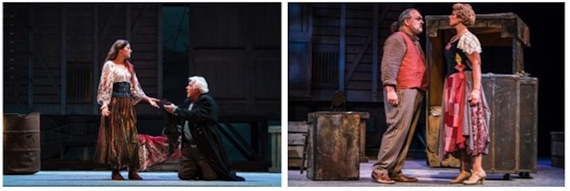
By Jose Andrade, ZEALnyc Contributing Writer, September 15, 2016
New York City Opera's history during the 21st century has been filled with volatility, misfortune and drama worthy of an opera. On September 8 (their first full season in four years) they opened with a double-bill of one act operas: Serge Rachmaninoff's rarely-seen Aleko and Ruggero Leonvcavallo's sturdy war-horse I Pagliacci at Jazz at Lincoln Center's Rose Theater. Although not a typical pairing, NYCO's choice of the two made for an interesting history lesson: both were written within a year of each other (1892 and 1893), and established both Rachmaninoff and Leoncavallo as first-rate composers. I attended the third performance on September 11, and am pleased to report that NYCO is on the right track to re-establishing itself as a force in the opera world.
In the case of this production, the "right track" proved to be literal -- both opera's utilized a railroad track, complete with box car and two station buildings as their setting. The production team differentiated the two operas by placing Aleko around 1900 in Russia on a gloomy winter night, and Pagliacci on a hot summer day in 1940's Italy. The chorus did their best to look cold during Aleko, and waving fans to cool themselves for Pagliacci, as well as performing double-duty as a dancing ensemble.
Both operas were conducted by James Meena in a sunken pit which helped create a balanced sound with the singers and orchestra. Maestro Meena allowed both pieces to go in their separate directions: Aleko with a more atmospheric tone, and Pagliacci with hot-blooded verismo over-drive.
Aleko is an interesting fin-de-siècle opera, both a faithful tribute to the Russian opera tradition of Glinka, Borodin and Tchaikovsky (who attended a performance and was very encouraging to young Rachmaninoff), while looking towards his own twentieth-century musical language. Ample choruses, a ballet, and scoring for low voices definitely give audiences an authentic Russian opera which NYCO accentuated through the casting of its two leads, bass-baritone Stefan Szkafarowsky (Aleko) and soprano Inna Dukach (Zemfira).
Szkafarowsky maintained a fervant driven sadness to his portrayal of Aleko, with a burnished color and mastery of diction. During his aria "Ves' tabor spit" (The whole camp sleeps) Szkafarowsky excelled in the more relaxed portions, allowing for a gradual buildup to an effective climax to the aria.
Dukach has a sumptuous sound, caressing notes as delicately as she stroked her body during her taunts of Aleko. An excellent piano elicited from her dying body was another reminder of the technical vocal gifts she exhibited throughout the opera.
Kevin Thompson as the Old Gypsy told his tale well in the beginning of the opera, displaying a phenomenal range and showed us his dramatic chops by being simultaneously sad, angry, disappointed and ultimately resigned to his daughter's death at the hands of Aleko. Tenor Jason Karn as the Young Gypsy made the most of the part as the young lover of Zemfira as did mezzo-soprano Olga Lomteva as an Old Gypsy Woman.
A ballet in the middle of Aleko added to the production by the solo talents of Yana Volkova and Andrei Kisselev as two gypsies in love. Volkova imbued her gypsy with a melancholy almost languid quality while Kisselev took an opposite approach as passionate and stern.
If I had to sum up NYCO's Pagliacci in one word, it would be "powerful." While the word is a bit cliché when discussing verismo opera, the power came from the soloists, all of whom were impressive. Veteran baritone Michael Corvino delivered his prologue "Si Puo?" with dash, proving to be an admirable foil for his colleagues. Soprano Jessica Rose Cambio as Nedda is a rare talent, gifted both as a singer and an actress. Her "Stridono lassù" (bird song) was as full-voiced as I have ever heard, with a strong top and good use of covering her piano notes for additional vocal color. Baritone Gustavo Feulien, presented a most imposing Silvio with sharp, powerful gestures in both his acting and singing; his duet with Cambio was both ardent and tender. Jason Karn as Beppe was the only performer in both operas and was significantly different than his brash Young Gypsy in Aleko; his Beppe was comical, and his serenade to Nedda in Act 2 offered an understated quality giving the audience a much needed break from the fomenting rage of Canio.
Tenor Francesco Anile's Canio was a virile, force of nature performance, one that was both disturbing and exhilarating to witness. His "Vesti la giubba," (Put on the costume) was heartbreakingly arresting. In Act 2, he began the "play-within-a-play" comedically -- a very interesting dramatic choice which added to his portrayal by providing an arc to his rage; too often Canio's are already completely demented as they start the play. With this added touch, his performance achieved a more fulfilling three-dimensional result, making for a memorable afternoon at the opera. Thank you NYCO!
Cover (l. to r.): Inna Dukach and Stefan Szkafarowsky in 'Aleko;' Francesco Anile and Jessica Rose Cambio in 'Pagliacci' / photo: Sarah Shatz/New York City Opera
__________________________________
Jose Andrade is a Contributing Writer for ZEALnyc and writes frequently on opera and classical music performances.
For more features on opera and classical music on ZEALnyc, read:
For all the news on New York City art and culture, visit ZEALnyc's Front Page.
